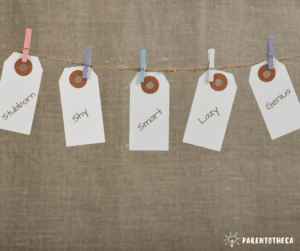“Definitions belong to the definers, not the defined.”
Toni Morrison
“You guys are so messy!” – I said a few weeks ago to our boys, picking up dirty clothes from all four corners of the room in the evening. “Boys are always messy” – I thought. Ok, they make a mess, but are they actually messy?
We all label our children, whether for good or bad. Often we do this on autopilot and don’t even pay attention to it. And of course, most of us have no idea about the consequences. According to the research, even at first harmless labels can hurt children’s self-esteem, behaviour and even long-term personality. We’ve talked about the danger of praise and positive labels already, but have you thought of the negative ones?
All children (and all of us) would face negative labels during the life span. But not always they would affect their (or ours) performance – all depends on the mindset.
Negative labels which you haven’t probably noticed
We begin labelling our child even before he is born – e.g. if the baby is moving a lot, we would call him hyperactive (that was our case). Then once he is out, we’d call him occasionally “stubborn”, “cheeky monkey”, “lazy”, “trouble”, “messy”, “shy” or whatever. Then, family members, grandparents and just strangers all have their say over our child… By the time the school starts, he’s heard a whole range of labels about himself before he can even have a chance to figure out who he is. And the society, in general, imposes loads of stereotypes, which can stick like bad labels – “girls are not good at driving”, “boys are bad at cooking”, “boys are better in math than girls”, etc. Heard that?
So, children do grow and develop, but unfortunately, labels often stick. And they could mess with your child’s mind, behaviour and as a result performance. All labels (good or bad) put us in boxes and instantly lead us to conclude what we can and can’t do.
How negative labels mess up our children (and us as parents as well)

Negative labels are usually bad. And as you can guess, psychologists put a lot of effort into studying how these labels influence achievement.
Dr Dweck, in her bestseller “Mindset” (check out our notes), looks at the research in this field from the mindset perspective.
She gives an example of C. Steele and J. Aronson research showing that even checking a box to indicate students’ race or sex can trigger the stereotype in their mind and lower their test score. At the same time, when there was no trigger for the stereotype, all people performed on pretty much same level. Powerful stuff!
She explains that stereotypes and negative labels fill people’s minds with distracting thoughts – with secret worries about confirming stereotypes. Like self-fulfilled prophecies. Here you go – if you are hit with the negative label, you are afraid of deserving it.
But what she has noticed in her research, that it doesn’t happen to everybody! And guess what? It mainly happens to people who are in a fixed mindset.
How a growth mindset can help
When people are in the growth mindset, the stereotype and labels don’t disrupt their performance. They don’t believe in permanent inferiority and fight back, trying new strategies, working harder and trying to catch up. When they face constructive feedback, they will recruit it for their own goals – to learn and grow.
So here is one more benefit of the growth mindset. And that’s something you can teach your child to support his resilience to the negative labels.
At the same note, you can consider being mindful when labelling your child ☺ Put yourself into a growth mindset firstly.
Questions for today: which labels do you put on your child (both positive and negative)? Are there any negative labels you can relate to yourself? How can you shift your mindset?
Let us know your thoughts!
Loads of love,
Irina and Dawid



